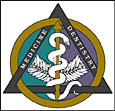 What is Orthodontics? What is Orthodontics?
The term itself comes from two Greek words: "orthos," which
means to right or correct and "odon," which is the Greek word
for tooth. Orthodontics is a sub-specialty of dentistry involving the
diagnosis, prevention and treatment of dental malocclusions. The practice
of orthodontics involves the design, application, and control of corrective
appliances, commonly known as braces, to treat and correct these problems.
 What
is an Orthodontist? What
is an Orthodontist?
An orthodontist is a dental specialist who after completing four years
of dental school has been accepted into an accredited orthodontic program.
He or she must then successfully complete an additional two to three
academic years of continuous advanced studies in this program approved
by the American Dental Association and American Association of Orthodontists.
This advanced training includes such diverse studies as physics, embryology,
genetics, human growth and development, cephalometrics, biophysics and
mechanical engineering. Upon graduating, they are awarded certificates
or degrees and can then specialize in orthodontics.
Please click here to read about Dr. John H.
Lee
 When
to visit an orthodontist? When
to visit an orthodontist?
The American Association of Orthodontists recommends that the initial
orthodontic evaluation should occur at the first sign of orthodontic
problems or no later than age 7. At this early age, orthodontic treatment
may not be necessary, but vigilant examination can anticipate the most
advantageous time to begin treatment.
 What
are the benefits of early orthodontic evaluation? What
are the benefits of early orthodontic evaluation?
Early evaluation provides both timely detection of problems and greater
opportunity for more effective treatment. Prudent intervention guides
growth and development, preventing serious problems later. When orthodontic
intervention is not necessary, an orthodontist can carefully monitor
growth and development and begin treatment when it is ideal.
 Why should malocclusions be treated? Why should malocclusions be treated?
According to studies by the American Association of Orthodontists, untreated
malocclusions can result in a variety of problems. Crowded teeth are
more difficult to properly brush and floss, which may contribute to
tooth decay and/or gum disease. Protruding teeth are more susceptible
to accidental chipping. Crossbites can result in unfavorable growth
and uneven tooth wear. Openbites can result in tongue-thrusting habits
and speech impediments. Ultimately, orthodontics does more than make
a pretty smile—it creates a healthier you.
|

